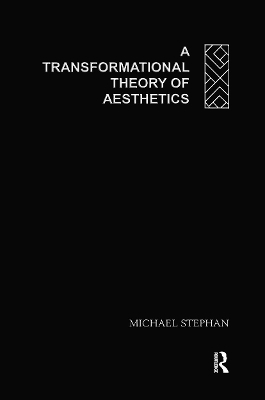
Transformatnl Theory Aesthetcs
Seiten
1990
Routledge (Verlag)
978-0-415-04196-6 (ISBN)
Routledge (Verlag)
978-0-415-04196-6 (ISBN)
First Published in 1990. How we perceive and respond to the visual image has been a traditional concern of psychologists, philosophers and art historians. In A Transformational Theory of Aesthetics, Michael Stephan breaks new ground by linking the findings of these areas.
First Published in 1990. How we perceive and respond to the visual image has been a traditional concern of psychologists, philosophers and art historians. Today, where the visual image increasingly permeates our everyday life and consciousness, the question becomes ever more relevant. How do we, for instance, instinctively ‘know’ what it is that a picture represents without having to be taught? How is it that we experience (aesthetic) pleasure in looking at certain pictures? How is it that we often want to talk about the pictures we look at? Such questions are currently asked by a wide range of disciplines, including: semiotics, psychoanalysis, anthropology, neuropsychology, and in general, contemporary critical analysis of the visual arts. In A Transformational Theory of Aesthetics, Michael Stephan breaks new ground by linking the findings of these areas. Drawing on their common area of knowledge, he has developed a radically new theory of picture perception and aesthetic response, arguing that images can generate in us a complex pattern of mental changes, or transformations. This is because the left and right hemispheres of the brain do not always work in harmony, hence the wide-ranging nature of aesthetic response to distinct art forms. A Transformational Theory of Aesthetics is essential reading to those seriously involved in linking the arts and cognitive sciences.
First Published in 1990. How we perceive and respond to the visual image has been a traditional concern of psychologists, philosophers and art historians. Today, where the visual image increasingly permeates our everyday life and consciousness, the question becomes ever more relevant. How do we, for instance, instinctively ‘know’ what it is that a picture represents without having to be taught? How is it that we experience (aesthetic) pleasure in looking at certain pictures? How is it that we often want to talk about the pictures we look at? Such questions are currently asked by a wide range of disciplines, including: semiotics, psychoanalysis, anthropology, neuropsychology, and in general, contemporary critical analysis of the visual arts. In A Transformational Theory of Aesthetics, Michael Stephan breaks new ground by linking the findings of these areas. Drawing on their common area of knowledge, he has developed a radically new theory of picture perception and aesthetic response, arguing that images can generate in us a complex pattern of mental changes, or transformations. This is because the left and right hemispheres of the brain do not always work in harmony, hence the wide-ranging nature of aesthetic response to distinct art forms. A Transformational Theory of Aesthetics is essential reading to those seriously involved in linking the arts and cognitive sciences.
Michael Stephan was born in 1948 in St Helier, Jersey. He currently lectures in the University of London and completed his doctoral research in the University of Sussex. He was a postgraduate Fine Art student at the Slade School, University College, London and has exhibited his work widely in Britain and Europe. Trevor Pateman (Author)
The biological and procedural bases of neuropsychology; the experimental evidence; the possible origins of cerebral specialization; the right hemisphere cognitive paradigm; children's drawings; the languages of art; a transformational theory of aesthetics; art and aesthetic experience; the transformational planes.
| Erscheint lt. Verlag | 2.8.1990 |
|---|---|
| Verlagsort | London |
| Sprache | englisch |
| Maße | 156 x 234 mm |
| Gewicht | 453 g |
| Themenwelt | Kunst / Musik / Theater ► Allgemeines / Lexika |
| Kunst / Musik / Theater ► Musik ► Pop / Rock | |
| Geisteswissenschaften ► Philosophie | |
| Geisteswissenschaften ► Psychologie ► Allgemeine Psychologie | |
| Geisteswissenschaften ► Psychologie ► Verhaltenstherapie | |
| Sozialwissenschaften | |
| ISBN-10 | 0-415-04196-1 / 0415041961 |
| ISBN-13 | 978-0-415-04196-6 / 9780415041966 |
| Zustand | Neuware |
| Haben Sie eine Frage zum Produkt? |
Mehr entdecken
aus dem Bereich
aus dem Bereich


